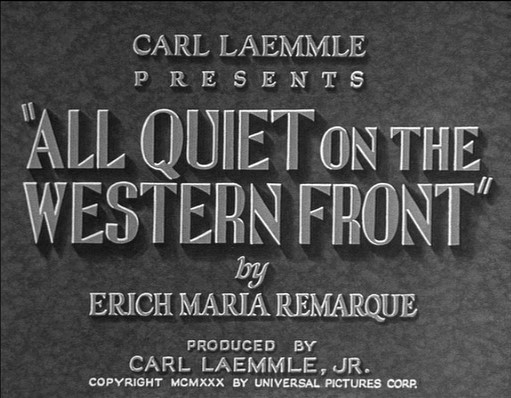
ALL QUIET ON THE WESTERN FRONT
US, 1930, 130 minutes, Black and White.
Louis Wolheim, Lew Ayres.
Directed by Lewis Milestone.
All Quiet on the Western Front is one of the earliest sound films and some of its techniques resemble silent films use of faces and setting of scenes. However, the film transcends any limitations of primitive sound techniques to offer us a strong anti-war experience that is all the more effective for being made in the early 30s. The enthusiasm, the drudgery, the disillusion of war are all effectively portrayed in a story of World War I where the American actors portray losing Germans. One wonders why the film was made this way in 1930 and what impact it made on the public. One indication is that it received the Oscar for the Best Film of 1930 and Best Director.
Director Lewis Milestone continued to make films into the 60's: A Walk in the Sun (a very fine World War II film), Les Miserables, Ocean's Eleven, Mutiny on the Bounty.
For historical, educational and personal enrichment values, this classic should be seen.
1. This film was made in 1930. How relevant is it today? How 'modern' is it in its presentation of the issues of war?
2. What was the importance of setting the story on the German side of World War I? What would have been the impact in 1930? (Did the fact that Americans with American accents and some American comic style, affect the impact much?)
3. Was this an anti-war film? Why?
4. What was the effect of the Professor's fatherland, iron men speech? Was there any truth in it? young men did enlist with those sentiments on both sides in 1914. How was this possible?
5. Were the young men typical? How did their imaginings during the speech show this? How was the shock of entering army life shown - the postman officer, the training, their leave and beating the officer?
6. How realistic were their ideas of war - e.g. when they arrived at the front and were hungry? The first mission with the barbed wire, the first death?
7. Comment on the effectiveness of the first battle sequence - the trench living, nerves, cards, continual bombardment for so long, then the trench fighting? Waiting for attack, the attack and the hand-to-hand fighting. Did this give an accurate picture of and feeling for the nature of war?
8. What was the significance of the rest sequence after combat - the remarks of the cook and his squabbling over rations, the contentedness of eating?
9. Why was the visit to the sick comrade effective - the discussion of the boots, his death, its effect on Paul? What comment did this make on war?
10. How effective were the sequences of the boots in the wav - the content on the face of the weavers, combat, deaths?
11. What points were made about the nature and origins of war in the conversation under the tree? The conversation was partly comic, yet it contained much of the 'message' of the film.
12. How were the effects of war highlighted in the bar where Paul and his companion admire the girl on the poster, in the swimming scene and the visit to the French girls? What effect does war have on behaviour, sense of reality, longings, principles?
1Z. What was the significance of Paul's fighting in the cemetery battle, the fear in the hole, the advance and retreat over his head, his reaction to killing a soldier close to him?
14. What did the hospital sequences show about war - the removal to the death roam, Paul's friend's amputation, Paul's return?
15. How unreal did the reaction of the civilians seem to Paul on leave, to the audience - his mother, father and friends, the professor's speech and the boys in the class? Why did Paul want to go back when he did not like or understand the war?
16. How strongly was the theme of comradeship presented - especially in the company?
17. Were you moved by Katcsinsky's disease? Why?
18. Was Paul's death and the ending of the film convincing and effective? What did the butterfly and Paul's reaching for it symbolise?
19. Do you think the message of this film about a war of the early 20th century is still valid and relevant?